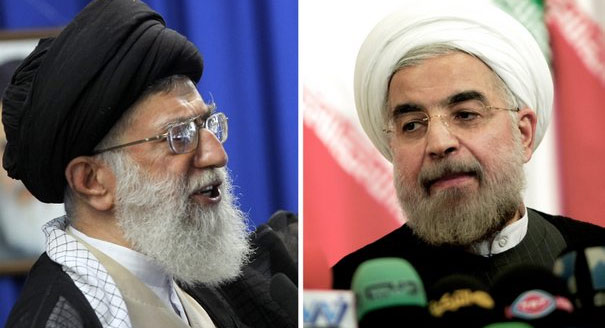While enthusiasm about the November 2013 breakthrough in the nuclear negotiations between Iran and Western states appears to have worn off, it is worth remembering that Iranian President Hassan Rouhani’s apparent “moderation” has never extended to his country’s Syria policy.
As a recent analysis shows, the new president’s opening is limited: of the four dimensions of politics—power, ideology, norms, and communications—the regime has changed its approach only to the latter two. It has embarked on a charm offensive (communication) and showed willingness to sign an international agreement advancing nonproliferation (norms).
Iran’s approach to power and ideology remains unchanged, and this directly affects its Syria policy. First and foremost, the Rouhani government sees its alliance with President Bashar al-Assad of Syria in terms of a regional balance of power (countering the rise of Sunni Muslim political forces and supporting “resistance” to the United States) as well as geopolitics (maintaining its access to Lebanon and Hezbollah).
Ideological factors also play an important role, although it is more complicated than a question of “Shia solidarity,” as some have claimed. The doctrinal relationship between Iranian Twelver Shiism, a sect of Shia Islam, and the Alawites of Syria is weak and certainly less important to the Iranian government than promoting the ideals of its own 1979 Islamic Revolution.
Not in Rouhani’s Hands
Therefore, Iran’s Syria policy underlines the limited character of the regime’s opening. It also makes clear that Rouhani is far from a reformist. Instead, he is a child of the 1979 revolution and, as such, sees regime survival as the top priority. Clearly, if Assad were to remain in power, this would enhance Iran’s legitimacy, both internally and externally—in the Muslim world, that is.
What is more important is that, even if Rouhani wanted to abandon Assad, he wouldn’t have the power to do so. The Syria portfolio is not in his hands but in those of the elite ideological military corps known as the Islamic Revolutionary Guard Corps and, ultimately, of the supreme leader of Iran, Ayatollah Ali Khamenei. Iran’s foreign minister, Mohammad Javad Zarif, confided as much to his American counterpart, Secretary of State John Kerry, earlier this year.
Admittedly, Khamenei and the Revolutionary Guards also control the nuclear file. But while the supreme leader supports nuclear negotiations aiming to achieve a permanent agreement, drawing the line only with regard to a broader rapprochement with the United States, there is no sign that he is prepared to give up on Assad.
A Costly Commitment
The back-and-forth about Iran’s potential participation in the Geneva II conference on peace in Syria, held in January and February 2014, is instructive.
It showed that Iran’s playing with words about not accepting any “preconditions” (that is, the results of the Geneva I conference declaration in June 30, 2012) did not suffice, precisely because there was no underlying policy change. Washington insists on precisely this policy change, and despite its willingness in principle to talk to Iran about Syria, the United States did not, in the end, accept an Iranian representative in Geneva.
For all these reasons, the Rouhani government will continue to provide military, intelligence, political, and financial support to Damascus. Neither the nuclear talks nor the Geneva II peace process is likely to change this—only the Iranian people can do so.
A delay in reaching a comprehensive agreement on the nuclear program may even be helpful in this regard. If the economic situation of average Iranians does not improve, and if Rouhani cannot deliver on the civil liberties he promised before the election, then people will start asking why Iran keeps pouring billions of dollars into Syria rather than spending them at home.






